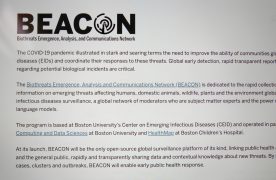With the number of opioid-related overdose deaths rising exponentially over the last few years, the American opioid epidemic has become a hot topic of conversation throughout the political, medical and educational communities. Boston University’s School of Public Health hosted a talk Wednesday afternoon to review the policy and treatment implications of the opioid epidemic within the context of addiction.
The talk, titled “Opioids and the Masses: Early Lessons from the Epidemic,” was led by featured speaker Sally Satel, a resident scholar at the American Enterprise Institute and a consulting psychiatrist at the Partners in Drug Abuse Rehabilitation and Counseling Clinic.
SPH Dean Sandro Galea said SPH hosted Satel because she could offer a thought-provoking perspective on the opioid epidemic.
“Opioids are a central health issue of our time,” Galea said. “Dr. Satel is a provocative and sometimes controversial thinker on opioids, and we wanted to hear her perspective.”
Galea said he thinks the opioid epidemic is important to discuss at BU due to the high number of fatalities it has caused.
“We have more than 600,000 people die a year from opioids,” Galea said. “I think we as a community and we as the School of Public Health need to have serious intellectual engagement with opioids.”
SPH Professor of Community Health Sciences Carol Dolan said she attended the talk to help her ensure that her students stay informed, and learn more about public health issues.
“It’s good to hear different perspectives,” Dolan said. “I was here last week for the Surgeon General who came and it’s good to hear how people are thinking about the problem on a broader level. The Surgeon General of course represents the current government. But I also know we have folks locally who are working with a really local problem.”
Satel spoke during the talk about how the recent influx of excessive amounts of opioids prescribed to patients is responsible for the epidemic. Between the 1980s and ‘90s, she said, there was a movement to be more responsive to pain that reached its peak in the 2000s, as the American Pain Society had lobbied to establish pain as a fifth vital sign.
Satel said most misused pills in the United States are not actually misused by the patients they are prescribed to, but by other people who get ahold of them.
“Even though prescribing is starting to go down, the vast majority of pills that were abused and still are abused are by people who frankly do get them out of medicine chests and pill mills, which is still around, though fewer in number,” Satel said.
Satel added that the tendency for doctors to try to prescribe fewer pain medications can have a negative effect on people with chronic pain.
“Everyone’s clearly trying to do the right thing,” Satel said. “But with all this worry about … ‘we can’t prescribe too much,’ it’s sort of migrated into the chronic pain patients, which is a totally different population.”
Satel said many users start abusing opioids because they want to change their mental state and alter their inner landscape.
“For people who are in distress, there’s nothing better than opioids,” Satel said. “Everyone has their so-called ‘drug of choice,’ but a lot of people think opioids are just phenomenal. I mean, they are, why else would they be named after the god of dreams?”
After the talk, Satel said she thinks it’s important that doctors minimize the amount of opioids in circulation while also properly treating patients with chronic pain.
“Doctors do have to prescribe fewer pills at any one time,” Satel said. “But again, they have to balance that with not creating an environment where people are afraid to prescribe opioids, especially to some long-term patients who really need. I think doctors do probably need some better education on how to prescribe and on these other alternatives.”
Anisha Borthakur, a first-year graduate student in SPH, said she thought Satel seemed passionate and knowledgeable throughout the talk.
“She had an agenda to what she wanted to say,” Borthakur said. “She had some good things to say, the whole idle hands thing, you’ve got to keep people busy because that’s what leads to relapse and leads to addiction. You’ve also got to consider the chronic pain patients. She sounded well educated on what she wanted to say and seemed like she knew what she was doing.”
Britta Seifert, another first-year graduate student in SPH, said she felt she learned a lot from the event.
“I really like these events,” Seifert said. “I think it’s a really great opportunity to learn from different people in the field and I really enjoy learning outside of a class when I can sit and enjoy and soak it in without worrying about the exam or anything like that.”













